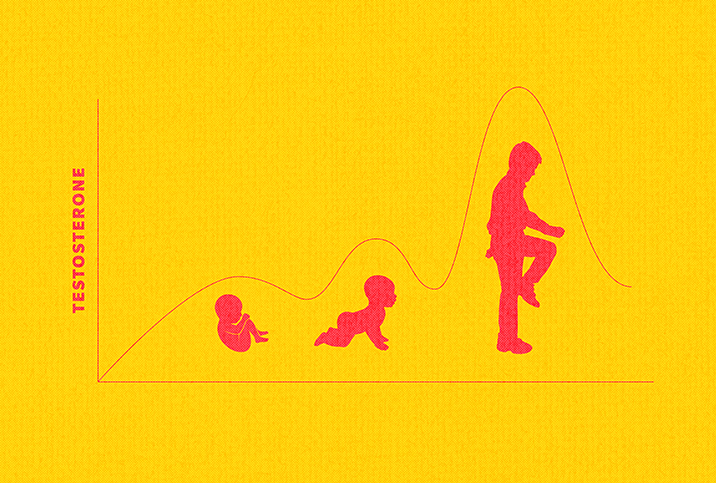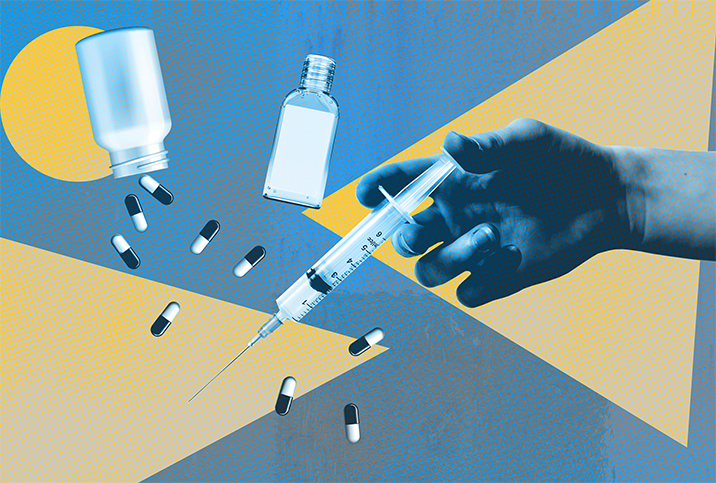Does Getting an Erection Increase Testosterone Levels?

Testosterone levels. It's a loaded topic. After all, testosterone plays a key role in your sex life. Low testosterone (low-T) can affect everything from your libido to your erections.
When it comes to low-T, is it possible that increasing sexual activity could boost your levels? Could getting more erections increase testosterone levels, or is it the other way around? Two doctors help unpack the relationship between testosterone and erectile function.
Testosterone 101
Testosterone is a key male sex hormone and is produced in the testicles. It does everything from triggering puberty in males to firing up libido and strengthening erections.
Testosterone is about more than sex stuff, though, according to David Bilstrom, M.D., the director of the International Autoimmune Institute & Bingham Memorial Center for Functional Medicine in Blackfoot, Idaho. It plays several roles in men's bodies, including the following:
- Making muscle mass
- Burning fat
- Improving verbal memory and mental capacity
- Boosting mood
- Controlling blood sugar
T-levels between 300 and 1,000 nanograms per deciliter (ng/dL) are considered normal, and 800 or higher is optimal, Bilstrom said. They are determined by two morning blood tests, since total testosterone is highest at that time.
Does getting an erection increase testosterone?
If you're struggling with low-T, know that there are ways to boost it. Could it be as simple as getting more erections?
Not so fast, said Timothy Clinton, M.D., a urologist at Brigham and Women's Hospital in Boston. While erections and testosterone are closely linked, the relationship isn't necessarily a two-way street.
"Testosterone is extremely important in the ability to achieve an erection for men," Clinton said. "Testosterone can affect erectile activity not only through libido and desire, but there is evidence to suggest it plays a role in vasodilation as well."
In other words, your body needs testosterone to get and maintain an erection, but your body doesn't need an erection to produce testosterone.
Still, doesn't it make sense for sexual behavior—such as stimulation that leads to an erection—to jolt testosterone production?
"Perhaps for a very short time," Bilstrom said.
A 2021 review of ejaculation and health outcomes found that watching erotic movies or having sex might lead to a short-term increase in testosterone levels.
A 2011 study suggested that sexual thoughts did not impact testosterone, however. In the study, 99 men provided saliva samples to establish their baseline testosterone. After imagining or writing about a sexual situation, the testosterone in their saliva remained unchanged—even if they experienced physical arousal.
Ultimately, any testosterone increase during arousal is only short-term. Ongoing lifestyle factors have a far greater impact on men with low testosterone levels, including testosterone deficiency.
So what does boost testosterone?
Not everyone needs to boost testosterone. Remember, T-levels between 300 and 1,000 ng/dL are considered healthy. The average measurement for men ages 20 to 44 is 466 ng/dL, according to a 2022 analysis.
Let's say you have low-T or want to prevent decreased testosterone as you age. These are concerns best navigated with your doctor, and that doesn't automatically mean testosterone replacement therapy. Several lifestyle changes can help boost testosterone levels—and likely improve your overall health—including the following:
- Managing stress. "Optimally managing the 'stress hormone' cortisol improves testosterone production," Bilstrom said. Conversely, the high cortisol levels associated with chronic stress have been shown to reduce blood testosterone levels.
- Keeping your weight in check. Obesity has a negative impact on testosterone levels, Clinton said. Excess body weight can also contribute to low libido and erectile dysfunction (ED).
- Controlling your blood sugar. Getting your blood sugar under control would have a more significant positive impact on testosterone levels than getting more erections. Both low-T and ED have been linked to diabetes.
- Exercising regularly. A 2016 study actually found that exercise had a greater boosting effect on testosterone than weight loss in men who were overweight or obese.
- Focusing on nutrition. Certain foods can boost testosterone levels naturally. These include Mediterranean diet mainstays such as fatty fish, leafy greens, pomegranate juice and more.
- Getting your ferritin levels tested. In some cases, too much iron can negatively impact sexual health. Excess ferritin, or 'iron stores,' as Bilstrom called them, tend to accumulate in the testicles, which can drive down testosterone production.
"It is the achieving of optimal testosterone production day in and day out by using the above techniques that will allow for optimal erections [and] sex drive," Bilstrom said.
Of course, not all low-T can be boosted through lifestyle changes. If you are experiencing low levels of testosterone, consult a healthcare professional. They can help you pinpoint any factors contributing to the problem. A doctor can also recommend supplements or medications, when necessary.


















